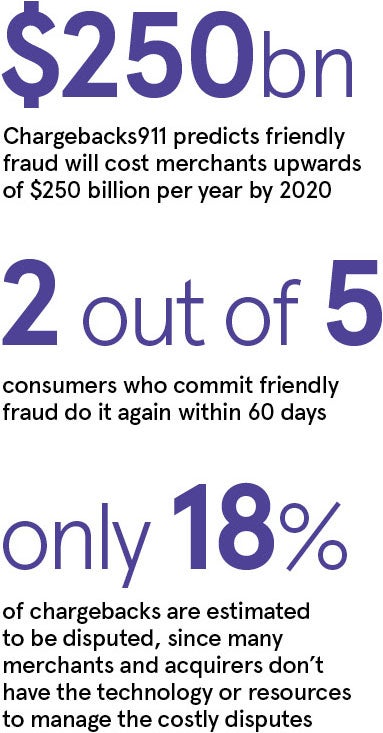The payments ecosystem has been transformed with new technologies offering more choice to consumers who now demand faster, frictionless transactions. Most investment has focused on the front-end of payments to increase the speed and frequency of transactions.
In comparison, historically there has been little to no investment in supporting the 2 per cent of transactions that result in chargebacks, since the original chargeback platform was developed in the mid-1970s. This is despite predictions from Chargebacks911 that so-called friendly fraud, whereby consumers seek to abuse the chargeback system to get a refund, will cost merchants upwards of $250 billion a year by 2020.
This lack of investment spiked a change in 2018 when Visa launched its Visa Claims Resolution programme. Now the conversation is changing and the industry is realising it can no longer write off the cost of chargebacks for fear of upsetting their customers, whether on the merchant or issuer’s side. 
Even with these new systems being put into place, chargeback growth in the UK is outpacing the growth of online transactions threefold, fuelled by the fact that two out of five consumers who commit friendly fraud do it again within 60 days.
“The problem costs both issuers and merchants,” says Monica Eaton-Cardone, chief operating officer at Chargebacks911, a chargeback management solution that helps online businesses and institutions minimise loss, mitigate risk, recover lost revenue and enhance the customer experience.
“We’ve seen a 20 per cent growth in chargebacks year on year, with friendly fraud doubling. Yet only 18 per cent of claims are estimated to be disputed, since most merchants and acquirers don’t have the technology or resources to manage the costly disputes.
“The dispute process is still quite archaic. It takes a lot of time, it’s not codified, there’s a lack of intelligence and there are no standardised procedures in place. Three quarters of banks we surveyed in Europe said their entire processing department for chargebacks and disputes was manual.
“There is no way you can scale this without some kind of intelligence and consistency. Consequently, consumers are exploiting that gap. This is the Achilles’ heel in the mission of protecting consumers, scaling at the rate required to match the surge of online growth.”
While it’s crucial that merchants and acquirers are able to challenge chargebacks in a cost-efficient and streamlined way, it’s important they see these claims as an opportunity to improve the consumer experience, rather seeing customers as the enemy.
In a world of emerging payment methods, chargebacks are a huge differentiator for card associations. No other payment method offers such a mechanism for assurance.
Chargebacks911’s tools work exclusively in the post-transaction environment, helping to increase the speed at which disputes and chargebacks can be shown to be valid or invalid.
The company’s platform leverages artificial intelligence and machine-learning to identify the source of the chargeback before submitting the evidence to the acquirer, card scheme or issuer. This intelligence helps merchants retrieve lost earnings from friendly fraud, ensure consumers are given a fair solution and provides issuers with valuable feedback that improves future decision-making in this area. It’s a win-win-win.
“We also provide feedback to the fraud filter so you don’t run the risk of blacklisting every customer who files a chargeback,” says Ms Eaton-Cardone. “Not all chargebacks are equal.
“Because we’re enabling fair and balanced decisions for everyone, we’re also able to help repair the relationship between merchants and their customers who’ll, hopefully, not only stop attempting friendly fraud, but also continue to do business with that company.
“Everything we do is data driven and we have invested a terrific amount in automating virtually every cycle of a payment dispute to improve quality and consistency across the board. We help foster a more digital environment so, instead of waiting for legacy systems that require a lot of manual work and lag 30 to 60 days before disputes are resolved, you can use intelligence right after that transaction settles.
“We will continue to help revolutionise and streamline the process, investing in intelligence that helps all counterparts in their unified mission to protect the consumer experience.”
For more information please visit chargebacks911.com

